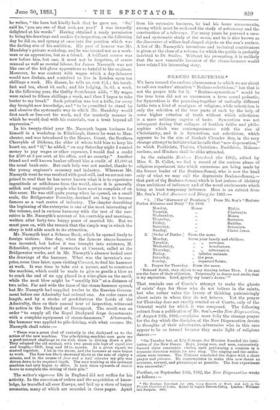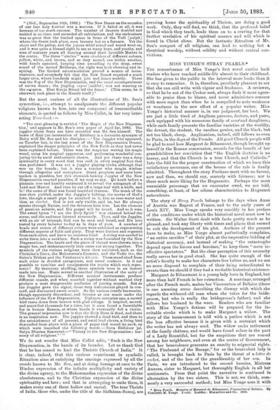-13RAIIMO ECLECTICISM.*
WE have termed the curious phemonenon to which we are about to call our readers' attention " Brahmo.eclecticism," but that is
not the proper title for it. " Brahmo-syncretism " would be the true term did not so uncommon a term sound pedantic, for Syncretism is the pounding-together of radically different faiths into a kind of amalgam of religions, while eclecticism is only the selection of the true parts of each by the help of some higher criterion of truth without which eclecticism is a mere arbitrary caprice of taste. Syncretism was not infrequent during that collapse of heathen faiths and philo- sophies which was contemporaneous with the rise of Christianity, and it is Syncretism, not eclecticism, which appears to be the aim of Keshub Chunder Sea, in the very strange attempt to initiate what he calls that" new dispensation,' to which Positivists, Theists, Christians, Buddhists, Mahom- medans, and Hindoos shall be alike attracted.
In the valuable ..M.alinio Year-hook (for 1882), edited by Miss S. D. Collet, we find a record of the curious phase of
religious experiment into which excursions are being made by- the former leader of the Brahmo-Somaj, who is now the head only of what we may call the degenerate Brahmo-Somaj,—
that part of the Brahmo-Somaj which is les§ jealous of idolatry than ambitious of influence and of the novel excitements which. bring at least temporary influence. Here is an extract from_ Mr. Sen's Pocket Almanac and Diary for 1883 :— "1. [The 'Harmony of Prophets.'] From Mr. Sen's "Brahmo Pocket Almanac and Diary" for 1883.
Monday, Honor Tuesday, Wednesday, Thursday, Friday, Saturday, Sunday, 2. [Order of Duties.] From the same.
Monday, Serve your family and children.
Tuesday, „ „ servants.
Wednesday, „ „ benefactors.
Thursday, „ „ adversaries.
Friday, „ inferior animals.
Saturday, „ the poor.
Sunday, „ departed Saints.
3. Prayer for Thursday. From the same.
Beloved Spirit, they object to my dancing before Thee. I do no see the force of their objection. Perpetually to deuce and smile, that is my aspiration. Lord, gratify my heart's desire.'"
That reminds one of Comte's attempt to make the ghosts
of saints' days for those who do not believe in the saints,. but. who rather value the luxury of thinking patronisingly about saints in whom they do not believe. Yet the prayer- for Thursday does not exactly remind us of Comte, only of the- Oriental world for which it was composed. The following extract from a publication of Mr. Sen's,—the New Dispensation, of August 13th, 1882,—explains more fully the strange prayer for the day which the disciples of the New Dispensation devote- to thoughts of their adversaries, adversaries who in this case appear to be so termed because they make light of religious dances :— "On Tuesday last, at Lily Cottage, the Minister founded the insti- tution of the New Dance. Boys, young men, and men, successively formed three concentric circles, each performing a rotation in a separate direction within its own ring. The singing and the enthu- siasm were intense. The Minister concluded the dance with a short prayer and protium. He contemplates to make this new dance as accurate, natural, and picturesque as possible. The first experiment was successful."
Farther, on September 10th, 1882, the New Dispensation wrote as follows:— The Brahmo Year-book for 1882. Lang Records pf Work and Life in the Thadic Churches of India. Edited by Sophia Dobson Collet. London: Williams and Norgate. 1683. 2.1 JP I
If
Rishis. Chaitauya. Moses. Socrates. Buddha. Scientists. Christ Jesus.
" (Ibid., September 10th, 1882.) The New Dance on the occasion of our late holy festival was a success. If it failed at all, it was because of too much success. The number of dancers doubled and trebled in no time, and exceeded all calculations, and the enthusiasm was so great that the limited space in front of the Vedi [pulpit] where the dance took place, soon became hot as a furnace. Yet the shout and the gallop, and the joyous whirl round and round went on, and it was quite a blessed sight to see so many boys, and youths, and men of maturer years all dancing around their Invisible Mother in the centre. The three "circles" wore chudders of different colours, yellow, white, and brown, and as they moved, one within another, with hands upraised, keeping time according to the deep, sweet sound of the Sacred Mridanga, the sight was both cheering and in- spiring. The limited accommodation proved a source of incon- venience, and everybody felt that the New Dance required a much larger area, where hundreds might join and dance merrily. There was the flag of the New Dispensation, and the usual accompaniment .of native dance ; the jingling nepur [anklet], was not wanting on the occasion. Bhai Kunja Bibari led the dance.' (This scene, be it observed, took place in the Mandir itself.)" But the most curious of all the illustrations of Mr. Sen's syncretism, i.e., attempt to amalgamate the different popular -.religions known to him, into one compound of irreconcileable elements, is quoted as follows by Miss Collet, in her very inter- esting Year-book :— "The next gleaning is entitled The Magic of the New Dispensa- tion,' and appears in Mr. Sen's own paper of April 1st, 1883. The juggler whose feats are here recorded was Mr. Sen himself. The name of Hari (an incarnation of Krishna) is a favourite synonym of Deity witli Mr. Sen and his disciples The Juggler who appeared, on Tuesday last, in the last scene of the New Dispensation Drama, explained the deeper principles of the New Faith as they had never been explained before. There was the magician waving his magic wand, using his magical apparatus, and performing wonderful con- juring tricks amid enthusiastic cheers. And yet there was a deep spirituality in every word that was said, in every magical feat that was performed. It was not a juggler playing tricks, although that "was on the boards ; but it was a teacher who taught wisdom through allegories and metaphots. Great prophets and seers have 'spoken in parables, but this clownish-looking Juggler of the New Dispensation enacted parables, if we may so say. tie knelt before a plantain tree and humbly entreated it to reveal the autograph of its Lord and Master. And then he cut off a large leaf with a knife, and lo! the name of Hari was found inscribed thereon. The trunk of the tree then yielded, under the Juggler's bidding, the nectar of God's Jove, through a small pipe he attached to it, first as rose-water and then as sherbet. God is not only visible, said be, but He always speaks through Nature, and the devotees hear him. Let the clamour of passions subside, and His gospel will be heard. And so it was. The sweet hymn "1 am the Holy Sprit" was chanted behind the scene, and the audience listened reverently. . Thus, said the Juggler, with an air of triumph, God can be seen and heard, and His love tasted by every believer to-day as in days of yore. A number of beads and stones of different colours were exhibited as representing different aspects of faith and piety. They were distinct and separate from each other, and knew no common bond. A string was needed to unite them, into a necklace. Such a string was furnished by the New Dispensation. The beads and the piece of thread were thrown into a magic box and instantaneously they came out strung together. The symbols Of the various religions were then exhibited, such as the Christian's Crors, the Mahometan's Crescent, and the Vedic Om, the Saiva's Trident and the Vaishnava's Khunti. These stand aloof from each other in decided antagonism, and never coalesce. Is it not possible to combine and amalgamate the truths which each repre- sents ? By dexterous shuffling, these symbols were in an instant made into one. Music served as another illustration of the unity of the New Dispensation. Different musical instruments produce different sounds, and when sounded together without method they produce a most disagreeable confusion of jarring sounds. But as the Juggler gave the signal, those very instruments played in con- cord, and discoursed sweet music. So the various creeds harmonise, though apparently discordant, and become as one music under the influence of the New Dispensation. Eighteen centuries ago, a sacred bird came down from heaven with glad tidings. It inspired, moved, and sanctified thousands for a time, but it soon found a formidable foe in human Reason, at whose hands it eventually fell a victim. The general impression now is that the Holy Dove is dead, and there is no inspiration now. The juggler showed a dead bird, and then to the astonishment of all present, and amid loud cheers, a living bird descended from above with a piece of paper tied round its neck, on which were inscribed the following words :—Nava Bidhiner jai, Satyrs Dharma Samanvai.—" Victory to the New Dispensation; har- mony of all religions." ' " We do not wonder that Miss Collet adds, "Such is the New Dispensation, in the hands of its founder. Let us thank God that he has ceased to lead the Theistic Church of India." It is clear, indeed, that this curious experiment in symbolic Ritualism aims at satisfying the cravings expressed by all the creeds known to Mr. Sen, and at doing homage at once to the Hindoo expression of the infinite multiplicity and variety of the divine agency, to the Mahommedan expression of the divine absoluteness, and to the Christian expression of the divine spirituality and love ; and that in attempting to unite them, it makes every, one, of them hollow and unreal. The true Theists of India, those who, under the title of the Sticlharan-Somaj, are
pressing home the spirituality of Theism, are doing a good work. Only, they will find, we think, that the profound belief in God which they teach, leads them on to a craving for that further revelation of his spiritual essence and will which is found in Christ alone. But the fantastic Ritualism of Mr. Sen's compost of all religions, can lead to nothing but a theatrical worship, without solidity and without central con- victions.



































 Previous page
Previous page